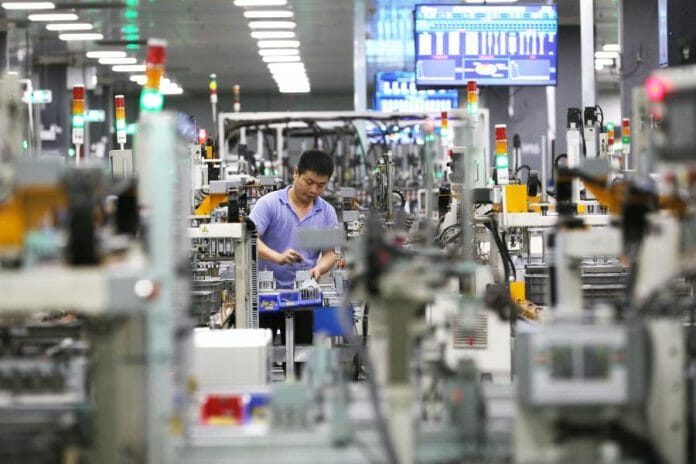China’s economic activity was likely mixed at the start of the year with property remaining a major drag, raising doubts about the nation’s ability to gain momentum and hit an ambitious growth target of around 5%.
Data due Monday is expected to show year-on-year growth retail sales and industrial output slowing compared to December, according to economists surveyed by Bloomberg. Stripping out base effects, momentum was probably little changed. Property development investment is seen plunging as the sector fails to mount a meaningful turnaround.
“Property is still the biggest problem,” said Raymond Yeung, chief economist for Greater China at Australia & New Zealand Banking Group Ltd. “The economy was relatively stable compared to the fourth quarter of last year, but it didn’t rebound.”
Beijing’s economic goal for the year is similar to its 2023 target, but reaching 5% in 2024 will likely be harder to achieve since last year benefited from a more favorable comparison with China’s messy pandemic fight. Yeung said the economy will need to improve more in March and through the rest of the year to hit the official benchmark.
Here’s a look at the National Bureau of Statistics data expected around 10 a.m. Beijing time on Monday:
Consumption Rebound
Retail sales likely rose 5% in the January-February period from a year ago, slowing from the 7.4% expansion recorded in December. Data for the first two months of the year is typically combined to avoid distortions from the Lunar New Year holiday.
The headline figure may not tell the whole story: Goldman Sachs Group Inc. estimated annualized sequential growth accelerated to 11.1% in the first two months from 6.1% in December. The lengthy holiday — which this year took place in February — likely contributed to the spending boost.
Early data has already suggested the new year travel boom revived consumption, at least temporarily. Tourism spending in that week exceeded pre-pandemic levels, while car sales for January and February grew 11% from a year earlier. China’s consumer price index also crept out of deflation after several months of declines.
Other indicators have been less encouraging, though, keeping a lid on any optimism about a consumption rebound. Per capita tourism spending remains low and shoppers are trading down on things from food to clothing. That’s intensifying a price war among retailers and carmakers.
Economists have also warned that the jump in consumer prices will likely be short-lived as overall domestic demand remains sluggish.
Industrial Production
Industrial output is estimated to have risen 5.2% year-on-year, lower than December’s growth rate of 6.8%. Goldman economists see an annualized month-on-month decline of 0.7%, compared to growth of 3.9% in the final month of 2023.
Factory activity has struggled to pick up the pace so far this year, with the official purchasing managers index shrinking for a fifth consecutive month in February. Weaker-than-expected demand following the Lunar New Year has pressured steel prices and led steel mills in China to cut production this month.
The Goldman economists pointed to strong export growth as a possible upside to industrial output. Overseas shipments jumped in the first two months, though officials and analysts have cautioned that trade will remain pressured this year because of geopolitical risks from primarily US-led restrictions.
Property Woes
Fixed-asset investment is projected to have risen 3.2% in the first two months of 2024 — a rate that would be slightly faster than the 3% growth recorded for the entirety of 2023.
The big contributor to that pickup will likely have been government-led investment in infrastructure. Beijing is expected to continue supporting the economy by pouring money into investment for similar projects this year.
At the National People’s Congress earlier this month, the government announced plans to issue 1 trillion yuan ($139 billion) worth of special sovereign bonds in 2024, a sign of how it’s ramping up fiscal stimulus.
Real estate remains a major challenge. Property investment is seen declining 8% in the January-to-February period. Such investment fell 9.6% for all of 2023, the second straight year of contraction.
The first two months of the year are usually a slow season for the real estate market, and there are already signs of a rocky start with new home sales so far plunging. Despite relaxed rules on buying homes, people remain reluctant because prices are still falling and many housing projects remain unfinished. They’re also pessimistic about their future income.
Rate Decision
The People’s Bank of China on Friday morning will announce the rate on its one-year policy loans, or the medium-term lending facility. The majority of economists polled by Bloomberg expect the rate to be left unchanged at 2.5%.
The central bank has already taken some steps to ease policies, including by lowering the reserve requirement ratio last month and freeing up cash for banks to lend. It also guided a key reference rate for long-term loans including mortgages to be lowered by a record.
Policymakers could also take the opportunity to inject more cash into the banking system. Several analysts expect a net injection Friday, providing the market with a boost above the 481 billion yuan worth of MLF funds that are maturing.
The PBOC’s space to ease monetary policy remains limited by factors including concerns about pressure on the yuan, given lingering uncertainty over when the Federal Reserve will start to cut interest rates in the US. – Bloomberg









